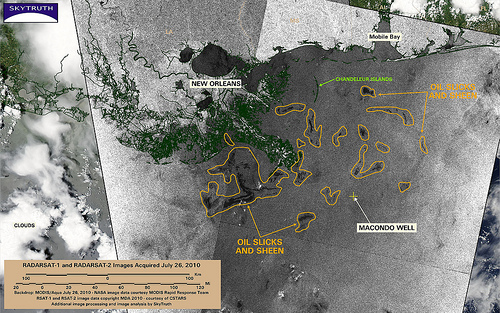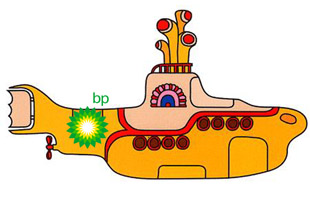I fired off a piece yesterday criticizing Michael Grunwald’s article in Time, which I feel significantly downplays what’s happening in the Gulf. (I’m not alone in the criticism; others, including a fellow Time writer, have pointed out that it’s far too early to tell the true extent of the damage, and we still don’t really know where all the oil is.) This lead to an interesting email exchange with Grunwald, whose previous work, as I mentioned yesterday, I have quite admired.
We’ve agreed to disagree on the subject. We also agreed very much in other areas, like the greater significance of longterm threats to the Gulf Coast that have nothing to do with the oil. I also told him we’d run his response to the criticism, which I’ve posted below:
You’re right that “in reality, we have no idea yet how bad the damage in the Gulf is.” I said that in my piece. But as I’m being deluged by complaints that nobody knows how bad this will be, that it’s premature and irresponsible to speculate, I have to say: Now you tell me? I hadn’t been to the spill before last week, and I certainly didn’t expect to write a piece like this, because everything I read and heard over the last three months—from the media, environmentalists and everyone else—assured me this was the worst ecological catastrophe in U.S. history. I assumed there was evidence that this was the worst ecological catastrophe in U.S. history. But there isn’t. Quite the contrary. And once I pointed that out, everyone suddenly decided there’s no way to know how big a deal this is. I eagerly await the new TV chryons about the “Potential Disaster in the Gulf.”
Look: nobody has challenged any of the data in my piece. You quoted David Pettit complaining about “oiled marshes as far as the eye can see,” but let’s quantify it: shoreline assessment teams have found 253.9 miles of oiled marshes, 38.5 miles of them heavily oiled, but only 350 oiled acres, because in most cases the oil is only penetrating a few feet. Very little is getting into the soils. That’s why Dr. Turner—perhaps the oil industry’s worst enemy in Louisiana—thinks airboats cleaning up the spill will destroy more wetlands than the spill itself. And remember: Louisiana was already losing 15,000 acres of wetlands a year before this. It lost more than 200 square miles of wetlands in Hurricanes Katrina and Rita. That’s why Dr. Kemp—of the Audubon Society, not BP!—called this “a sunburn on a cancer patient.” That’s why Gulf Restoration Network’s Aaron Viles—who you quoted in your piece, to show what a big deal this spill was—told me in an email today that “the coastal wetlands crisis makes the BP disaster look like a lovely day at Audubon Park.”
More than 2000 square miles of coastal Louisiana have vanished into the Gulf. Now that’s an environmental disaster, even if it doesn’t involve telegenic oiled pelicans. It’s not a potential problem. I’m sorry you think I’m contributing to “the already waning interest in the disaster among the American public,” but I’m not recommending apathy. I think we should monitor the spill—and fix the damn coast! I wrote a book about a dying ecosystem; I care about this stuff. But I don’t think it’s the role of journalists or even environmentalists to declare calamity just because there’s a convenient villain; it hurts our credibility when we try to point out real calamities like global warming. And it encourages the Governor Jindals of the world to pour hundreds of millions of dollars into useless sand berms and potentially harmful rock jetties to show the world they’re responding to the crisis.
A similar example: It’s true that some scientists worry that the BP spill may lower dissolved oxygen levels. But so far, there’s been only modest depletion—nothing approaching hypoxia. Meanwhile, there’s already a gigantic hypoxia problem in the Gulf. So what deserves wall-to-wall coverage: The actual environmental disaster of the Gulf’s dead zone, or a potential environmental problem from the spill?
Kate, I hold no brief for BP. This was an awful and probably criminal screwup, regardless of the extent of the damage. I hold no brief for fossil fuels; I’ve banged my spoon on my high chair about ending our addiction.
And maybe I shouldn’t have mentioned Limbaugh; as I made clear in the piece, he’s not my go-to guy for eco-analysis. But he did have a point—what do they say about broken clocks?—and the fact that nobody else bothered to make it suggests something disturbing about environmental and journalistic groupthink. I’m sorry to be the bearer of good news, but why not be happy that the Deepwater oil is relatively light, the Gulf is extremely warm, the Mississippi River helped keep most of the mess away from shore, and Mother Nature is tough? Three oiled dolphins are three too many, but they don’t add up to an ecological calamity. I wish there was less environmental apathy too, but just because the world is finally paying attention does not mean we should start crying wolf.















